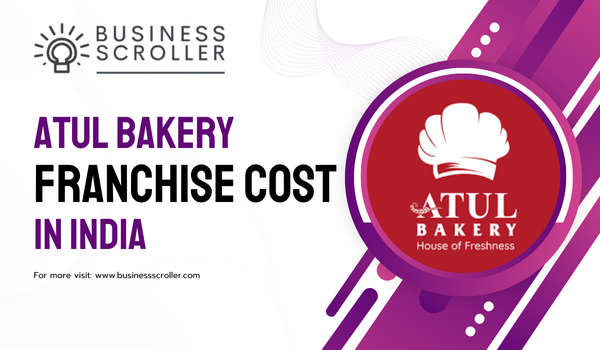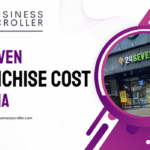Looking to enter the bakery and confectionery business with a recognisable name? Atul Bakery — a fast-growing bakery chain with outlets across India (and some presence overseas) — is often listed as an affordable mid-range franchise option for aspiring food entrepreneurs. Below I break down the franchise models you’ll see, realistic investment numbers, ROI expectations, eligibility criteria, step-by-step application process, plus practical tips and red flags to watch for. I’ve used official franchise pages and reputable franchise directories to give you a pragmatic planning guide — but always request the brand’s written commercial sheet before committing money.
Why Consider an Atul Bakery franchise?
Atul Bakery positions itself as an accessible neighbourhood bakery with a broad product mix — cakes, pastries, breads, snacks and eggless options (important for many Indian markets). For franchisees, the brand offers:
- Proven recipes and product standardisation,
- Training and ongoing operations support, and
- Marketing/brand recognition that helps shorten the customer-acquisition curve.
Those advantages can make a franchise faster to scale than an independent bakery, provided you secure the right site and control costs.
Franchise models — what you’ll typically find
- Standard Retail Outlet (walk-in bakery) — 300–500 sq.ft.; counter, display, small production/back-kitchen.
- Larger Flagship / High-street Store — 500–1,000+ sq.ft.; expanded seating, larger production capacity.
- Kiosk / Quick-serve Format — smaller footprint for malls or kiosks in transit locations (lower capex but limited SKUs).
- FOFO / FOCO variations — some franchisors run models where the franchisee owns the outlet while operations can be company-assisted or fully franchisee-operated; confirm model when enquiring.
How Much Does an Atul Bakery Franchise Cost?

Different directories and the brand’s franchise page list slightly different figures; the table below consolidates the most commonly reported ranges so you can budget conservatively.
| Cost item | Indicative range (INR) | Notes / source |
| One-time franchise fee | ₹1,50,000 – ₹5,00,000 | Many sources show franchise fee bands around ₹2L–5L; FranchiseIndia lists ₹3L. |
| Setup / interiors & equipment | ₹10,00,000 – ₹20,00,000 | Counters, ovens, refrigeration, display units and small production setup. |
| Working capital & opening inventory | ₹1,50,000 – ₹5,00,000 | Initial raw materials, packaging, salaries, and cash buffer. |
| Area required | 300 – 500 sq.ft. (typical) | Brand often requests compact neighborhood footprints for standard outlets. |
| Indicative total first-year outlay (single unit) | ₹15 Lakh – ₹25 Lakh | Consolidated planning range seen across brand page and franchise portals. |
Quick takeaway: Most credible listings and the official franchise page place a typical single-unit investment roughly between ₹15–20 lakh, though premium locations and larger formats push the number higher.
Revenue, margins & ROI expectations
- Revenue streams: retail sales (walk-in customers), customised cakes/orders, bulk/corporate orders, and occasional catering.
- Margins: bakery businesses typically have healthy gross margins on value items (cakes, customised orders) but lower margins on commodity bakery items; directories and operator summaries often quote anticipated returns and payback windows in the 12–24 month band for well-managed outlets.
- What drives ROI: location (footfall), average ticket size (price of cakes/combos), weekday vs weekend sales mix, and efficient inventory/food-cost control. Don’t expect instant profits — margin management and waste control are key.
Eligibility Criteria
While exact terms come from the franchisor, common requirements across franchise listings are:
- Ability to invest the required capital and provide working capital buffer.
- Suitable premises (300–500 sq.ft. typical) in a visible, high-footfall neighbourhood or mall kiosk.
- Basic KYC documents (PAN, Aadhaar, bank statements); in many cases the franchisor will ask for a short business plan and proof of funds.
- Willingness to follow brand SOPs and attend mandatory training programs.
Step-by-step: How to apply for an Atul Bakery franchise
- Shortlist your format & location — decide standard outlet vs larger store; secure prospective site photos/lease terms.
- Contact the brand — Atul Bakery publishes a franchise enquiry channel; use their official “Get Franchise” form or the franchise phone number to request the commercial sheet. (Official franchise contact numbers are listed on their site.)
- Request the Franchise Disclosure/Commercial Sheet — insist on a written breakup: franchise fee, royalty (if any), training, mandatory purchases and signage guidelines.
- Submit documents & site details — KYC, bank statements, lease agreement or owner consent, and a brief business plan.
- Site visit & evaluation — the franchisor will evaluate your location and projected footfall.
- Sign agreement, pay prescribed fees & begin fit-out — get a clear timeline for product supply, training and the official launch.
- Training, soft launch & scale — attend franchisor training, run demo days, refine SKU mix and control costs in the first 90 days.
Practical Tips & Red Flags
- Ask for references — speak to current Atul Bakery franchisees in nearby cities about real sales, hidden costs, and support levels.
- Get everything in writing — especially supply terms, mandatory purchases and any buy-back or return policy on unsold seasonal inventory.
- Control perishable inventory — bakeries are sensitive to wastage; implement daily production planning and special-order flows.
- Red flags: large “verbal” promises without written commercial terms, high mandatory markups on ingredients or equipment from a single supplier, or requests for undisclosed third-party payments.
Final word
An Atul Bakery franchise presents a mid-range bakery opportunity with the advantages of brand support and standardised products. Expect a realistic single-unit investment in the ₹15–25 lakh range, typical premises of 300–500 sq.ft., and payback under good execution commonly in 12–24 months — but results depend entirely on location, cost control and local demand. Before you sign, request the official commercial sheet from Atul Bakery, speak to existing franchisees, and get the agreement vetted by a lawyer.

Shashi Kant is the Founder and Editor of BusinessScroller.com, a leading platform for business insights, finance trends, and industry analysis. With a passion for journalism and expertise in business reporting, he curates well-researched content on market strategies, startups, and corporate success stories. His vision is to provide valuable information that empowers entrepreneurs and professionals. Under his leadership, BusinessScroller.com has grown into a trusted source for in-depth articles, customer care guides, and financial expertise.


Outlet Services retail store in Saharsa Bihar India